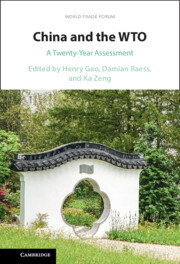Book contents
- China and the WTO
- China and the WTO
- Copyright page
- Contents
- Figures
- Tables
- Contributors
- Preface
- Acknowledgments
- Introduction
- Part I Setting the Stage: Chinese Perspectives on China’s Accession to the WTO
- Part II Political and Economic Implications of China’s WTO Membership
- Part III China and Global Trade Governance
- Part IV Responses of China’s Trading Partners
- Part V China and Investment Governance
- Index
17 - China’s Entry into the WTO
A Mistake by the United States?
from Part IV - Responses of China’s Trading Partners
Published online by Cambridge University Press: 14 September 2023
- China and the WTO
- China and the WTO
- Copyright page
- Contents
- Figures
- Tables
- Contributors
- Preface
- Acknowledgments
- Introduction
- Part I Setting the Stage: Chinese Perspectives on China’s Accession to the WTO
- Part II Political and Economic Implications of China’s WTO Membership
- Part III China and Global Trade Governance
- Part IV Responses of China’s Trading Partners
- Part V China and Investment Governance
- Index
Summary
The conclusion that China’s accession to the World Trade Organization (WTO) was a failure from a US perspective stems from: 1) loading too many issues and expectations—including an entire panoply of national security and geostrategic concerns—on to the WTO and its trade-rules-based, binding dispute settlement system to address; 2) failure by the United States and the rest of the world to use the tools available as a result of China’s accession to the WTO to both protect their domestic markets and hold China to account for its WTO commitments; and 3) China’s U-turn away from market-economy reforms to a much more state-centric, Chinese Communist Party (CCP)-run the economy. Addressing the United States’ concerns with China will require working to strengthen the WTO and then using it to take on a more limited set of trade concerns while using other tools to address broader concerns over China, both bilaterally and in conjunction with allies and partners.
Keywords
Information
- Type
- Chapter
- Information
- China and the WTOA Twenty-Year Assessment, pp. 400 - 426Publisher: Cambridge University PressPrint publication year: 2023
- Creative Commons
- This content is Open Access and distributed under the terms of the Creative Commons Attribution licence CC-BY-NC 4.0 https://creativecommons.org/cclicenses/
Accessibility standard: Unknown
- 5
- Cited by
